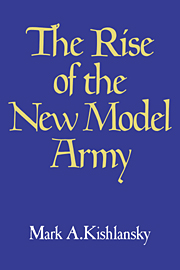8 - The Emergence of Radical Politics
Published online by Cambridge University Press: 17 September 2009
Summary
And always men may see it, that Parliament privileges, as well as Royal prerogative, may be perverted and abused, or extended to the destruction of those greater ends for whose protection or preservation they were admitted or intended.
“To speak a sad truth,” Sir William Waller reflected when he reconstructed the events that led the Army to march on London in August 1647, “the destruction of the Parliament was from itself.” Like Holles and Whitelocke, Waller attributed the decline of parliamentary authority to its failure to suppress the Army's incipient mutiny in March, when they might have “crushed the cockatrice in the egg.” Their concessions had served only to increase the Army's appetite for power and to encourage its supporters at Westminster. “The Parliament fell neither bound nor fettered,” Waller concluded, “but betrayed by the insidious practices of its own members.” Neither in 1647 nor in later years when these men penned their apologetic memoirs did they understand the change they had wrought in political practice or the consequences that change had for the system of government they had fought to defend. To them the explanation for the Army's actions in the summer of 1647 was remarkably clear: the Army and its party in the Commons had betrayed their trust and their nation. As Holles sardonically stated: “These are they who fight for privilege of Parliament, – who have made a covenant with God and man so to do; and well they perform it; those they mislike must be thrust out by head and shoulders; and such as remain, if they be not obedient to them shall be served with the same sauce: and this is to make a free Parliament.”
- Type
- Chapter
- Information
- The Rise of the New Model Army , pp. 223 - 272Publisher: Cambridge University PressPrint publication year: 1980



